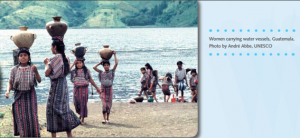There seems to be a tendency among those who have spent their lives as citizens of First World countries to take access to clean water for granted and fail to ever consider the political nature of water-related issues on a global scale. Our bodies themselves consist of over 50% water and there is little debate over the fact that, like air and food, it is imperative for human survival. Other than human consumption, water is required in agriculture, food preparation, cleaning, washing, personal hygiene and waste disposal(1). However, much like land, the commodification of water, and the interrelated inequities, are inextricably bound to the history of imperialism, capitalism and patriarchy.
The Ahlers and Zwarteveen article(2) presents a robust argument for the reformation of neo-liberal water proposals regarding allocation and distribution, which are built upon pre-established economic models of privatization and commercialization and encourage dispossession of vital resources from those who are systemically oppressed by rigid power structures – i.e. women, people of color and other groups of underprivileged people.
The crux of Ahlers and Zwarteveen’s inquiry is that the praxis of neo-liberalism that offers an ‘equalist’ response to widespread concerns related to resource bureaucracy and land tenure rights, intentionally disregards and denies the gendered dynamics, abstractions and biases deeply embedded in existing socio-political configurations. Their aim of methodologically re-politicizing water questions, de-individualizing water access and aligning legislated water rights with intersectional feminist principles is scrupulously articulated and theoretical solutions are posited for the global scale. However, little is said about how such solutions could be practically implemented or where similar efforts have been made, which could serve as models for future policy amendments.
For this reason, I found that in complement with each other, the two readings formed a thorough critique of contradictory neo-liberal water politics, which disregard both the “social dependencies that are intrinsic to water ownership”(2) and the “central role of women in water management”(1) by assuming a level playing field. Ahlers and Zwarteveen appeal broadly to the insitutional coruption and legal pluralism that dictates how the variable availability of water is managed to facilitate the prosperity of dominant markets, while the UN Water policy brief provides numerous case studies that demonstrate how these injustices trickle down and have detrimental effects on the health, education and economies of local communities.
Women bear the heaviest burdens of these effects, as they are expected to perform unpaid labour related to procuring of water, and the domestic duties that use it – i.e. cooking, cleaning, washing, etc. Despite this, and the fact that the International Water and Sanitation Centre has empirically proven that water sanitation projects “run with the full participation of women are more sustainable and effective” than those that aren’t(1), women are still largely excluded from decision-making roles in resource management sectors and in many countries, do not have direct access to water due to how little land they own.

The UN Water policy brief uses the term gender mainstreaming to refer to the suggested measures delineated in the Ahlers and Zwarteveen article, establishing a layer of abstraction that allows more tangible realizations of the aforementioned solutions to be discussed. While my reflection has framed global water issues as being in a dire, irrecoverable state, the policy brief summarizes several instances of concerted efforts to improve water distribution and irrigation systems in impoverished cities over the world, and elect women into managerial positions related to the implementation of these solutions. In particular, the Interagency Task Force on Gender and Water, established in 2003 and who developed the policy brief, has been effective in consolidating the objectives of gender and water / sanitation specialists and bringing the gendered nature of water issues to the forefront of international political discourse.
______________________________________________________________________
Bibliography
- GWTF, Gender, Water And Sanitation: A Policy Brief. UN Water, 2006. Web. 16 Oct. 2016. Water For Life.
- Ahlers, Rhodante and Zwarteveen, Margreet. “The Water Question In Feminism: Water Control And Gender Inequities In A Neo-Liberal Era”. Gender, Place and Culture 16.4 (2009): Web. 16 Oct. 2016.